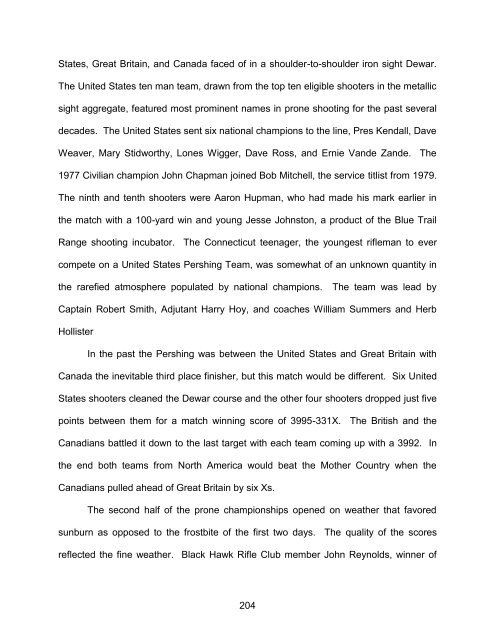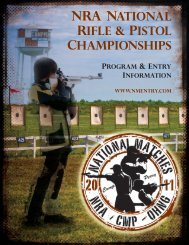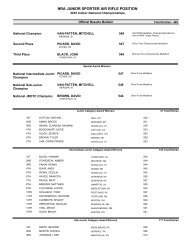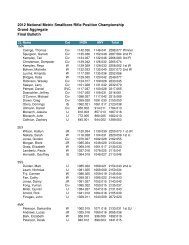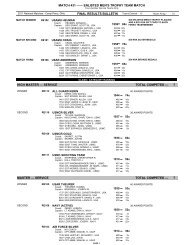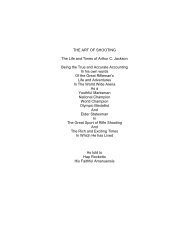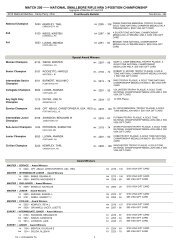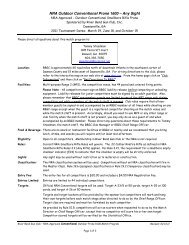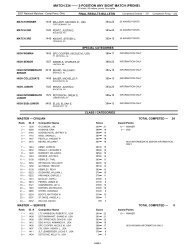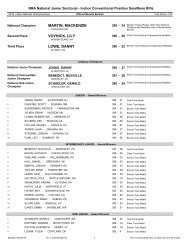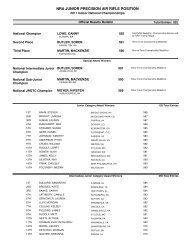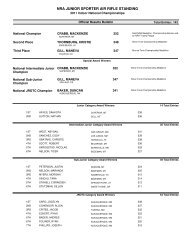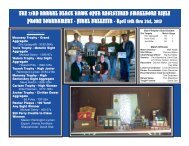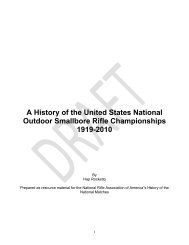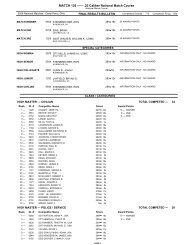- Page 1 and 2:
A History of the United States Nati
- Page 3 and 4:
TABLE OF CONTENTS Acknowledgement C
- Page 5 and 6:
smallbore rifles were the poor cous
- Page 7 and 8:
As Harlee was putting the range bac
- Page 9 and 10:
simulate the 30 caliber matches, so
- Page 11 and 12:
Starting on August 4 th , the small
- Page 13 and 14:
Venerable Casey to standardize smal
- Page 15 and 16:
equipment, fees, targets, and prize
- Page 17 and 18:
the War Department in Washington. A
- Page 19 and 20:
an officer in the Indiana National
- Page 21 and 22:
for various reentry matches, even p
- Page 23 and 24:
of the strong winds. In the end the
- Page 25 and 26:
Fifteen matches made up the total p
- Page 27 and 28:
Through the good offices of Major G
- Page 29 and 30:
stopped but the temperature had dro
- Page 31 and 32:
Facing a 15-mile an hour wind from
- Page 33 and 34:
Atlantic seashore; it had been the
- Page 35 and 36:
shorter and more intense tryout sys
- Page 37 and 38:
three stage match, ten shots at 50,
- Page 39 and 40:
BSA rifles while the ammunition of
- Page 41 and 42:
The program had changed slightly fo
- Page 43 and 44:
early. After a five minute sighting
- Page 45 and 46:
CHAPTER THREE Surviving the Great D
- Page 47 and 48:
sought out every legitimate advanta
- Page 49 and 50:
members. The Pennsylvania Railroad
- Page 51 and 52:
Earlier that year a team from the U
- Page 53 and 54:
1932 The National Matches were Fede
- Page 55 and 56:
seven shooters had yet to drop a po
- Page 57 and 58:
only required that the candidate sh
- Page 59 and 60:
completed Mess Hall gossip centered
- Page 61 and 62:
established a record of 3971X4000.
- Page 63 and 64:
across the entire trial period, was
- Page 65 and 66:
occasion to introduce its challenge
- Page 67 and 68:
Woodring and Vere Hamer were in a t
- Page 69 and 70:
The smallbore championships prepare
- Page 71 and 72:
With the individual matches complet
- Page 73 and 74:
CHAPTER FOUR The Great Diaspora…
- Page 75 and 76:
Commonwealth but, being as far from
- Page 77 and 78:
Symmes, who totaled a 3171-136X, sh
- Page 79 and 80:
at 50 meters with a scope, tied the
- Page 81 and 82:
to arms. NRA Executive Vice Preside
- Page 83 and 84:
Comers’ Match. His 397 bested fou
- Page 85 and 86:
assortment of allergies and develop
- Page 87 and 88:
The cousins Moore, Bob and Wayne, t
- Page 89 and 90:
No one, including, the match winner
- Page 91 and 92:
ough conditions that would make the
- Page 93 and 94:
Moore experienced serious difficult
- Page 95 and 96:
edged out Rosenberg by two points f
- Page 97 and 98:
closely connected venues on the wes
- Page 99 and 100:
out of a sand pit, next to the Jack
- Page 101 and 102:
Ingleright, Rossman, and Van Gaston
- Page 103 and 104:
and Moschkau closed the top three w
- Page 105 and 106:
With the tournament coming to an en
- Page 107 and 108:
The inaugural 6400 championship wou
- Page 109 and 110:
Cook with a one point lead over Tri
- Page 111 and 112:
After the popularly successful trai
- Page 113 and 114:
collectively, his 3193-236X earned
- Page 115 and 116:
aggregate. Henry Benson and John Cr
- Page 117 and 118:
of the past while it adapted to the
- Page 119 and 120:
CHAPTER SIX A Decade Of Transitions
- Page 121 and 122:
In a fine twist of fate Marianne Dr
- Page 123 and 124:
championship had no clear-cut leade
- Page 125 and 126:
Eighty four instructors directed th
- Page 127 and 128:
If there is one uncertainty in the
- Page 129 and 130:
Yet, despite everyone’s best effo
- Page 131 and 132:
the prone title in 1962. He was an
- Page 133 and 134:
Larry Wilkens was on a roll, pullin
- Page 135 and 136:
accomplishment she shot a perfect s
- Page 137 and 138:
than Adams who ended the first day
- Page 139 and 140:
Meredith was named Open, Service, a
- Page 141 and 142:
the Army. They were able to coordin
- Page 143 and 144:
Former Air Force Team member Henry
- Page 145 and 146:
It was a decade of transition from
- Page 147 and 148:
graybeards, or so it seems. The exp
- Page 149 and 150:
anxious to get to the volunteers’
- Page 151 and 152:
affair. Jack Schweitzer won the fir
- Page 153 and 154: premier of long range shooting trop
- Page 155 and 156: Southeast Asia, Jack Foster and Lon
- Page 157 and 158: Section A-9 of the National Match p
- Page 159 and 160: Ross, in a valiant attempt to regai
- Page 161 and 162: The usual excitement that surrounds
- Page 163 and 164: shooters who dropped points while t
- Page 165 and 166: just as it had done prone, it came
- Page 167 and 168: him the metallic sight championship
- Page 169 and 170: capped froth and buffeting all of t
- Page 171 and 172: a three or four point edge unless d
- Page 173 and 174: alternates Inez Sargent and Chandle
- Page 175 and 176: smallbore shooting during the years
- Page 177 and 178: As it had so often happened in the
- Page 179 and 180: now would either require a performa
- Page 181 and 182: By end of the second day the top tr
- Page 183 and 184: Beard continued to harry Wigger wit
- Page 185 and 186: Camp Perry veterans were pleasantly
- Page 187 and 188: not placed in the money all week bu
- Page 189 and 190: In a year bereft of typical Camp Pe
- Page 191 and 192: The second year of three-position c
- Page 193 and 194: Chapter Eight Wigger Wins-Still Aga
- Page 195 and 196: and then each went on to earn NRA A
- Page 197 and 198: 555Xs. All National Guard Sergeant
- Page 199 and 200: string. Wigger put that thought to
- Page 201 and 202: after the matches on Sunday, return
- Page 203: Kendall and Stidworthy-both former
- Page 207 and 208: DCM matches but most would return h
- Page 209 and 210: Kendall would also prove to be a te
- Page 211 and 212: winning teams, be named a collegiat
- Page 213 and 214: shooter and coach Arpad Tamas, was
- Page 215 and 216: Wigger usually and wisely leaves a
- Page 217 and 218: Roberts Team yielded some interesti
- Page 219 and 220: ow seat. Four national prone champi
- Page 221 and 222: 1599, just an X ahead of Marine Gar
- Page 223 and 224: Bernosky and Sergeant Marvin Spinks
- Page 225 and 226: Pres Kendall was cruising on the mo
- Page 227 and 228: with a 1597-135X, just ahead of Oak
- Page 229 and 230: seen her through to the any sight c
- Page 231 and 232: 37Xs. All National Guard Private Fi
- Page 233 and 234: Few scores produce more stories fil
- Page 235 and 236: first spread her shooting mat on th
- Page 237 and 238: American Gary Stephens, a student a
- Page 239 and 240: way. Lones Wigger made it to the to
- Page 241 and 242: metallic sight match. Ghiselli had
- Page 243 and 244: place Steve Goff’s 400-35X was th
- Page 245 and 246: An interesting technological innova
- Page 247 and 248: The scope savvy hard holders manage
- Page 249 and 250: CHAPTER NINE The Wigger Era Closes,
- Page 251 and 252: Barush had not loosened her grip on
- Page 253 and 254: 100 yard match went to Wigger, but
- Page 255 and 256:
Connecticut junior shooter represen
- Page 257 and 258:
At the end of the first day the you
- Page 259 and 260:
Benning’s Major Jim Meredith took
- Page 261 and 262:
In the last match of the day West c
- Page 263 and 264:
Ken Benyo, a student at Widner Univ
- Page 265 and 266:
team, with essentially the same fou
- Page 267 and 268:
in championship history. In haste,
- Page 269 and 270:
5994X6000, good for the silver meda
- Page 271 and 272:
When the any sight aggregate began
- Page 273 and 274:
Marsha Beasley were the hard holder
- Page 275 and 276:
400 on the line in the 100-yard mat
- Page 277 and 278:
The collegiate champion was Darren
- Page 279 and 280:
worn the crown for three consecutiv
- Page 281 and 282:
At the awards ceremony, after the P
- Page 283 and 284:
1995 Momentum is an important aspec
- Page 285 and 286:
halves of the tournament easily coa
- Page 287 and 288:
starting blocks quickly, with a 400
- Page 289 and 290:
lame and none of the credit for a w
- Page 291 and 292:
match. Specialist Troy Bassham, who
- Page 293 and 294:
Lones Wigger was trying to run his
- Page 295 and 296:
Trophy from the hands of the hosts.
- Page 297 and 298:
out consistently good scores that s
- Page 299 and 300:
Matches. It was hoped that better s
- Page 301 and 302:
Irene Fisher and Coach Gloria Parme
- Page 303 and 304:
third place, just one X back. Babb
- Page 305 and 306:
Johnson, an AMU shooter, won the pr
- Page 307 and 308:
The next 40 years saw it stored awa
- Page 309 and 310:
able to boast that they had a total
- Page 311 and 312:
Caldwell in 1919. This 80 th annive
- Page 313 and 314:
turned in a winning score in the 10
- Page 315 and 316:
after all of those second day victo
- Page 317 and 318:
Winning both the metallic and any s
- Page 319 and 320:
good to be in front, a one-point le
- Page 321 and 322:
Carolyn Millard-Sparks, 6387-507X,
- Page 323 and 324:
might not have been able to survive
- Page 325 and 326:
across the Critchfield Course of fi
- Page 327 and 328:
Army’s SP4 Trevor Gathman was in
- Page 329 and 330:
eating at long range, dropping 14 p
- Page 331 and 332:
chance to see his name at the top o
- Page 333 and 334:
followed her to pick up the Stark P
- Page 335 and 336:
Jamie Beyerle, of the University of
- Page 337 and 338:
next five days the prone community
- Page 339 and 340:
passed several were blown from the
- Page 341 and 342:
its horn would be more shrill. As t
- Page 343 and 344:
hoped the matches would be cancelle
- Page 345 and 346:
6377-468X to 6376-480X while Ault p
- Page 347 and 348:
greater fame later in the week, top
- Page 349 and 350:
third when the Gold team came in wi
- Page 351 and 352:
match bulletin with a second place
- Page 353 and 354:
While the postal shooters were blas
- Page 355 and 356:
away. Kevin Nevius and Boyd Goldsby
- Page 357 and 358:
Devcon and pillar bedded by Kevin N
- Page 359 and 360:
The 2004 National Three Position Ch
- Page 361 and 362:
it best, Beyerle was among them. Ho
- Page 363 and 364:
and powers of concentration he deve
- Page 365 and 366:
Doerschler, Beyerle, and Wes Robins
- Page 367 and 368:
Overcast skies marked the first day
- Page 369 and 370:
was out of concern for the shooters
- Page 371 and 372:
matches usually resemble the out of
- Page 373 and 374:
Lussier, both with 38X cleans. Beye
- Page 375 and 376:
high senior while Gideon grabbed Th
- Page 377 and 378:
Beyerle overcame her slow start, an
- Page 379 and 380:
Leydig, Dan Ault, and Elizabeth Lec
- Page 381 and 382:
shot a 400-35X, Barnhart a 34X clea
- Page 383 and 384:
Juniors Jillian Szymonica, Casey Ga
- Page 385 and 386:
the US score of 1993-143X. In the e
- Page 387 and 388:
and just two Xs off of the National
- Page 389 and 390:
senior champion Gideon. Junior Thom
- Page 391 and 392:
Anti hold’s the Perry record in t
- Page 393 and 394:
silver medals and the junior any si
- Page 395 and 396:
highest score, a 399-25X, to keep h
- Page 397 and 398:
Gentlemen were in third with a 1549
- Page 399 and 400:
One can never get too complacent in
- Page 401 and 402:
Edie Reynolds, who so often is on t
- Page 403 and 404:
Anti used the same gear he had in t
- Page 405 and 406:
of the matches, was second with a s
- Page 407 and 408:
efficiently. A bronzed sculpture, m
- Page 409 and 410:
Much to the relief of the belly sho
- Page 411 and 412:
finishing with perfect scores and d
- Page 413 and 414:
The Made In America Match was next,
- Page 415 and 416:
posted a near record score of 800-5
- Page 417 and 418:
Homer Pearson, as the top salesman
- Page 419 and 420:
Committee, was match winner with 37
- Page 421 and 422:
the Stark Prone Trophy plaque as we
- Page 423 and 424:
third, but this time it was Tarl Ke
- Page 425 and 426:
championship while Goff and Reya Ke
- Page 427 and 428:
fended off a 2226-54X challenge by
- Page 429 and 430:
to either the awards window or thei
- Page 431 and 432:
needed a continuation of fire would
- Page 433 and 434:
perspective it was noteworthy as it
- Page 435 and 436:
low loose, and it seemed that the c
- Page 437 and 438:
Goldsby won his second match of the
- Page 439 and 440:
Martha Kelley became the first reci
- Page 441 and 442:
A close battle developed in the sta
- Page 443 and 444:
an English Match, 60 shots prone wi
- Page 445 and 446:
With a head of steam from position,
- Page 447 and 448:
Edie Fleeman and Remington Lyman un
- Page 449 and 450:
The final day of the 2009 champions
- Page 451 and 452:
they worked out how to deal with th
- Page 453 and 454:
Ronald Durcholz, of Orchard Park, N
- Page 455 and 456:
day. The match, run by the NRA Smal
- Page 457 and 458:
a longhorn team, Sam Muegge and Kat
- Page 459 and 460:
for Nevius for, while the dropped p
- Page 461 and 462:
Justin Tracy, and Michael O’Conno
- Page 463 and 464:
After the horrid weather conditions
- Page 465 and 466:
Randle Team Captain Lenore Lemanski
- Page 467 and 468:
Conditions picked up during the 100
- Page 469 and 470:
descending order was Reya Kempley
- Page 471 and 472:
of mental calculation as to who mig
- Page 473 and 474:
Drew alumna Caitlyn Morrissey, of t
- Page 475 and 476:
Kempley was second and Angeli pulle
- Page 477 and 478:
The second half of the tournament b
- Page 479 and 480:
ewarded with his second consecutive
- Page 481 and 482:
THE REMINGTON TROPHY A silver cup,
- Page 483 and 484:
THE MARIANNE JENSEN DRIVER MEMORIAL
- Page 485 and 486:
THE WALTER S. TOMSEN TROPHY A gift
- Page 487 and 488:
THE PERSHING TROPHY General of the
- Page 489 and 490:
THE RHEINISCHE-WESTFALISCHEN-SPREGS
- Page 491 and 492:
THE WILLIAM KRILLING TROPHY William
- Page 493 and 494:
Appendix B National Outdoor Smallbo
- Page 495 and 496:
Aggregate Jeffrey Doerschler 1161-5
- Page 497 and 498:
1948 Arthur E. Cook No Competition
- Page 499 and 500:
LTC Lones W. Wigger, Jr USA David B
- Page 501 and 502:
Outdoor Smallbore National Champion
- Page 503 and 504:
1974 John Moschkau No Competition N
- Page 505 and 506:
Ronald F. Durcholz William F. Beard
- Page 507 and 508:
1946-1954 15 : A 320 shot aggregate
- Page 509 and 510:
1969-1977: A 320 shot aggregate of
- Page 511:
Appendix E Locations Of The Nationa


